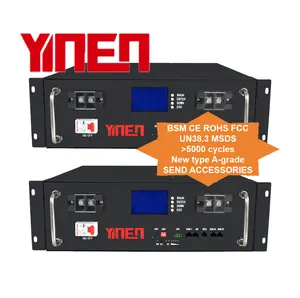
High Voltage Rack Mounted Energy Storage Solar Inverter 15Kw Lithium Battery Pack Battery LiFePO4 Batterie Box


100ah 200ah 300ah Mobile Stack Lifepo4 Battery Pack 51.2v With Inverter In Parallel For Home Energy Storage 5kwh 10kwh 15kwh


















A battery inverter is a pivotal component in modern energy systems, converting direct current (DC) from batteries into alternating current (AC) for use in various applications. This technology is integral to renewable energy solutions, particularly in solar energy systems, home energy storage, and backup power applications.
Battery inverters come in several types, each suited to specific needs. The pure sine wave inverter is sought after for its ability to produce a smooth and consistent AC waveform, compatible with all AC electronic devices. For more complex systems, a split phase inverter can offer versatility in power distribution. The single phase inverter is commonly used in residential settings, providing an efficient conversion from DC to AC for household use.
The efficiency of a battery inverter is significantly influenced by its charge controller technology. MPPT (Maximum Power Point Tracking) and PWM (Pulse Width Modulation) are two prevalent technologies that manage the charging of batteries from solar panels. MPPT is renowned for its efficiency in converting a wider range of voltages, making optimal use of solar energy, while PWM is a more cost-effective solution that works well with systems designed for consistent solar exposure.
Compatibility with various battery types is a crucial aspect of selecting the right inverter. Whether it's for a lithium-ion battery, known for its long life and high energy density, a lead-acid battery, valued for its reliability and cost-effectiveness, or a deep cycle sealed gel battery, which offers maintenance-free operation and leak resistance, the inverter must match the battery's voltage and chemistry to ensure efficient energy conversion and storage.
The application range of battery inverters is extensive. They are not only foundational in home appliance power supply but also in larger scale energy storage systems. In the realm of renewable energy, they are indispensable in solar energy storage systems, allowing for the utilization of solar power even when the sun isn't shining. Their adaptability makes them suitable for a variety of settings, from residential to commercial and industrial.
Modern battery inverters offer several advantages. They provide a reliable power source in areas with unstable electricity supply and are essential in managing the intermittency of renewable energy sources. The advancement in inverter technology has also led to improved energy conversion efficiency, resulting in reduced energy losses and better overall system performance.